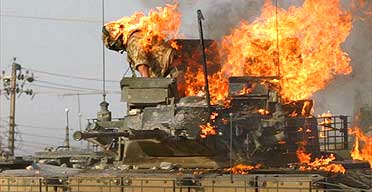Iraqi Violence Escalation: Inside Job
"British troops fired on crowds throwing petrol bombs, burning furniture and tyres which set at least one tank on fire. The fighting broke out after two British soldiers, allegedly dressed as Arabs, opened fire on a police patrol killing one officer and wounding another. The Ministry of Defence confirmed that two military personnel were detained by Iraqi authorities today, but would not comment on rumours that the soldiers were working undercover."
http://www.guardian.co.uk/world/2005/sep/19/iraq
Entire article:

A British soldier prepares to jump from a burning tank which was set ablaze after a shooting incident in the southern Iraqi city of Basra. Photograph: Atef Hassan/Reuters
Violence erupted in Basra this afternoon following the arrest of two British soldiers for allegedly killing one policeman and wounding another.
British troops fired on crowds throwing petrol bombs, burning furniture and tyres which set at least one tank on fire. Reuters witnesses said a British soldier was engulfed by flames as he scrambled out of the burning tank, being pelted with stones by the crowd. Two Iraqis were killed in the violence, an Interior Ministry official said. The fighting broke out after two British soldiers, allegedly dressed as Arabs, opened fire on a police patrol killing one officer and wounding another.
The Ministry of Defence confirmed that two military personnel were detained by Iraqi authorities today, but would not comment on rumours that the soldiers were working undercover.
One of the men sat with a bandage on his head after they were detained, a Reuters photographer said. His trousers were stained with blood spots.
A witness said after the clash with troops people drove through the streets of Basra with loudhailers demanding that the undercover Britons remain in detention and be sent to jail.
Iraqi authorities were already on high alert today as Shia pilgrims poured into the holy city of Karbala for a religious festival expected to attract more than 1 million people.
Officials in Baghdad also announced that one of Saddam Hussein's nephews had been sentenced to life in prison for funding the insurgency, and would stand trial on other charges. His trial had been kept secret by the authorities.
Around 6,000 police officers and troops were stationed around Karbala, 50 miles south of Baghdad, and the streets were closed to all vehicles in a bid to prevent suicide car bombers.
Authorities said they had already uncovered a cache of explosives and arrested four insurgents for allegedly planning an attack on the pilgrims today.
Rahman Mishaw, a police spokesman said the explosives were found on farmland on the outskirts of Karbala. He said three "non-Iraqi Arabs" were arrested along with a man armed with several hand grenades who was walking with a procession of pilgrims.
A recent wave of bombings and shootings, which started last Wednesday, left more than 150 people dead and 500 wounded in Baghdad. One car bomb killed at least 88 people in Iraq's worst single attack since February.
Religious gatherings have become particular targets. In December, more than 50 pilgrims were killed in a series of bombings in Karbala and in March, at least 181 people died in coordinated bombings of Shia pilgrims in Karbala and Baghdad. Both attacks were blamed on Sunni extremists.
Mohammed al-Hasnawi, the Karbala police chief, said more than 1 million people were expected to gather today to celebrate Imam al-Mahdi's birth in 868 AD. Shia Muslims believe the Imam vanished without a trace and will return before judgment day to lead the faithful in a battle for a true and just Islamic state.
In Baghdad, the Iraqi government announced that Saddam Hussein's nephew, Ayman Sabawi, had been "sentenced to life in prison for funding militants and possessing and manufacturing roadside bombs".
Mr Sabawi, the son of Saddam's half-brother Sabawi Ibrahim al-Hassan, who served as a presidential adviser before the invasion, was captured in early May. But authorities had not announced that his trial was under way.
The Iraqi central criminal court in Baghdad said Mr Sabawi would face a second trial - starting at the beginning of November- for other crimes to which he allegedly confessed during his pre-trial interrogation.
His colleague, Tareq Khalaf Mizal, arrested along with Mr Sabawi, was sentenced to six years' jail.
Meanwhile, Iraq's former defence minister, Hazim Shaalan, is expected to be arrested this week in connection with the disappearance of more than $1bn.
Mr Shaalan served under the interim prime minister, Iyad Allawi. It is not known whether the money disappeared after the fall of Saddam Hussein or when he was in power.
Radhi al-Radhi, the head of Iraq's Commission on Public Integrity, said he handed a file of evidence against Mr Shaalan to Iraq's central criminal court two months ago and expected a warrant for his arrest to be issued in the next week.
Saddam and three co-defendants are to go on trial before Iraq's special tribunal on October 19, charged with ordering the massacre of Shias in 1982 in Dujail, a town north of Baghdad, after a failed assassination attempt on the former Iraqi leader.
He faces the death penalty if found guilty. Saddam also faces around a dozen other trials for alleged crimes committed by his regime, including the gassing of Kurds in Halabja and suppressing a Shia uprising in the south in 1991.


